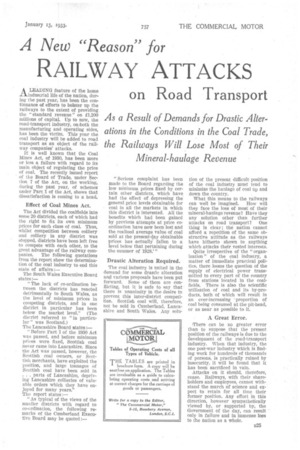A New "Reason" for
Page 39

If you've noticed an error in this article please click here to report it so we can fix it.
RAILWAY ATTACKS
on Road Transport
A LEADING feature of the home il.industrial life of the nation, during the past year, has been the continuance of efforts to bolster up the railways to the extent of providing the "standard revenue" on £1,200 millions of capital. Up to now, the road-transport industry, on both the manufacturing and operating sides, has been the victim. This year the coal industry will be added to road transport as an object of the railway companies' attacks.
It is well known that the Coal Mines Act, of 1930, has been more or less a failure with regard to its main object of regulating the price of coal. The recently issued report of the Board of Trade, under Section 7 of the Act, on the working, during the past year, of schemes under Part 1 of the Act, shows that dissatisfaction is coming to a head.
Effect of Coal Mines Act.
The Act divided the coalfields into some 20 districts, each of which had the right to fix its own minimum prices for each class of coal. Thus, whilst competition between colliery and colliery in any district was stopped, districts have been left free to compete with each other, to the great advantage of the railway com panies. The following quotations from the report show the determination of the coal industry to end this state of affairs :— The South Wales Executive Board states:—
" The lack of co-ordination between the districts has reacted detrimentally to South Wales, as the level of minimum prices in competing districts, and in one district in particular has been below the market level." (The disrrict referred to "in particular" was Scotland.)
The Lancashire Board states:—
" Before Part I of the 1930 Act was passed, and before minimum prices were fixed, Scottish coal never came into Lancashire. Since the Act Was passed, however, the Scottish coal owners, or Scottish merchants, have exploited the position, and large tonnages of Scottish coal have been sold in . . parts of Lancashire, depriving Lancashire collieries of valuable orders which they have enjoyed for many years."
The report states :— " As typical of the views of the smaller districts with regard to co-ordination, the following remarks of the Cumberland Executive Board may be quoted :— "Serious complaint has been made to the Board regarding the low minimum prices fixed by certain other districts, which have had the effect of depressing the general price levels obtainable for coal in all the markets in which this district is interested. All the benefits which had been gained by previous attempts at price coordination have now been lost and the realized average value of coal sold at the present-day obtainable prices has actually fallen to a level below that pertaining during the summer of 1928: "
Drastic Alteration Required.
The coal industry is united in the demand for some drastic alteration an.fl various proposals have been put forward. Some of them are conflicting, but it is safe to say that there is unanimity in the desire to prevent this inter-district competition. Scottish coal will, therefore, not be sold in Cumberland, Lancashire and South Wales. Any solu
tion of the present difficult position of the coal industry must tend to minimize the haulage of coal up and down the country.
What this means to the railways can well be imagined. How will they face the loss of most of their mineral-haulage revenue? Have they any solution other than further attacks on road transport? One thing is clear ; the nation cannot afford a repetition of the same obstructive attitude as the railways have hitherto shown to anything which attacks their vested interests.
Quite irrespective of the " organization " of the cbal industry, a matter of immediate practical politics, there looms the question of the supply of electrical power transmitted to every part of the country from stations located in the coalfields. There is also the scientific utilization of coal and its by-products, both of which will result in an ever-increasing ' proportion of coal being consumed at the pit-head, or as near as possible to it.
A Great Error.
,There can be no greater error than to suppose that the present position of the railways is due to the development of the road-transport industry. When that industry, the one post-war industry which is finding work for hundreds of thousands of persons, is practically ruined by insecurity, it will be found that it has been sacrificed in vain.
Attacks on it should, therefore, cease. Railways, with their shareholders and employees, cannot withstand the march of science and expect to retain for all time their former position. Any effort in this direction, however sympathetically viewed by, or supported by, the Government of the day, can result only in failure and in immense loss to the nation as a whole.




























































































